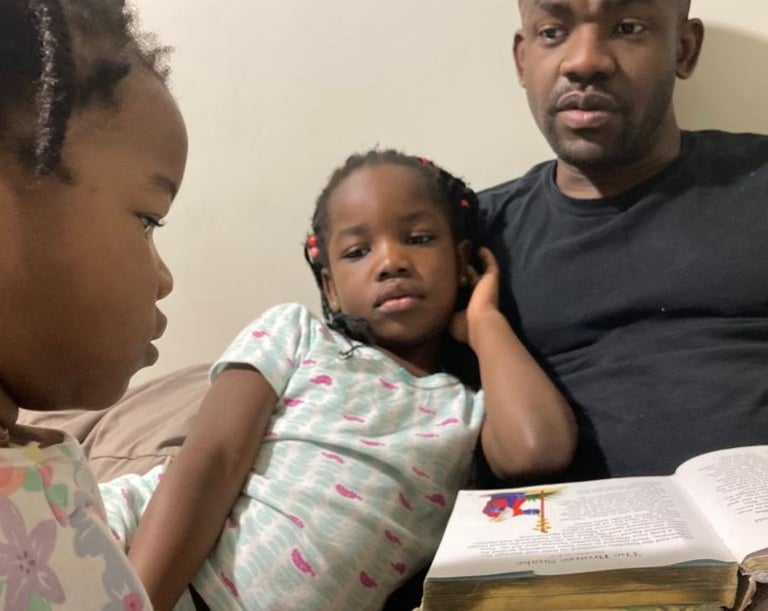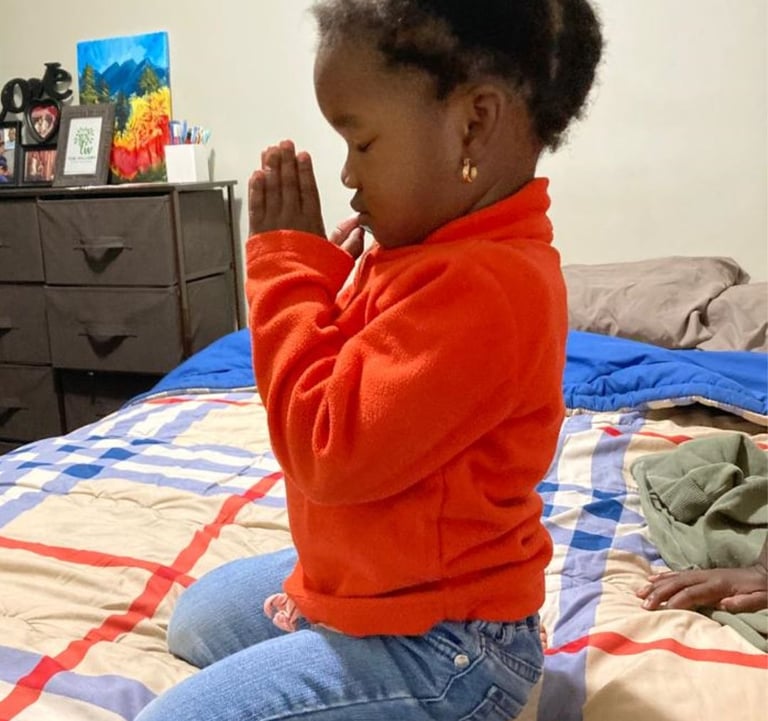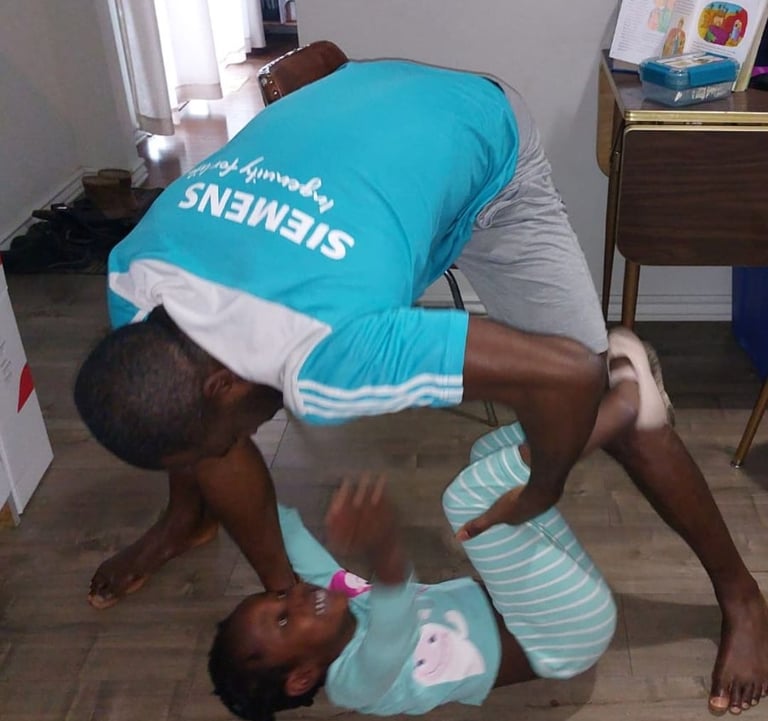Getting Your Children to Love the Bible
If your children see you reading the Bible only during family devotions, they associate an open Bible with devotions only. It is what you expose them to that they will adopt.


I got inspiration to write this article following conversations with a few parents who expressed some difficulty with teaching children the Bible or being consistent with Bible studies and devotions with the children. I must mention that I am NO expert. However, there are some things that we do at home that seems to continually rouse our children’s desire for God, the Bible, and God-related things. It’s really beautiful to watch them. Again, I’m no expert, but I truly pray that some or all of the tips I'll be sharing below can help you and your family build a solid Bible life and pattern for your children.
1. Be An Example
As parents, we are mirrors for our kids. And this is for kids of any age. They watch us and especially, when they are much younger, want to copy us. When your children see that you value your Bible study time, they are more likely to want to pick up their own Bible and read or be interested in reading the Bible too. If you read or spend time in the word only when you have to preach (e.g., pastors and ministers), your children will associate Bible reading with church, the microphone or preaching; and since they are not preachers or ministers, they won’t see the need or value in reading the Bible. If your children see you reading the Bible only during family devotions, they associate an open Bible with devotions only. It is what you expose them to that they will adopt.
One day my 5-year-old daughter, came into my room and saw me reading my Bible. She goes, “Mummy, you’re a Bibler.” I asked her, “What does “Bibler” mean?” She said, “Someone who reads the Bible a lot.” That made me glad; but even more, it made me understand why her and her little sister love their Bibles. She knows I’m not a preacher or pastor or women leader or anything important in the church. So, Bible reading for her isn’t something associated with any of those things. For her, a Christian reads their Bible. It's as simple as that.
When you prioritize the word in your life and in your home, acting and living as the Bible says you should, using Jesus and other Bible characters as examples for how you live as a family, your children will follow suit.
2. Be Diligent And Consistent
My all-time best scripture in the Bible on raising children is Deuteronomy 6:6-7. It says, “And these words that I command you today shall be on your heart. You shall teach them diligently to your children, and shall talk of them when you sit in your house, and when you walk by the way, and when you lie down, and when you rise.”
I discovered the verses over a year ago when I downloaded a memory verse app on my phone. That was the sample verse that had come with the download. When I learned those verses, I clutched onto them like a purse. There were some words that made the difference for me:
- Diligently: meaning that teaching God’s word to my children is something I had to do with utmost care, conscientiousness, with persistent effort and attention. Bible time with the kids should never be wishy-washy. It should be done with every passion in me.
- Talk of them: (1) when you sit in your house (2) when you walk by the way (3) when you lie down (4) when you rise. I interpreted those as:
(1) When you sit in your house MEANS when we are just at home, everything should point to God and His word.
(2) When you walk by the way MEANS on our drive to school or driving out of town, we should discuss the Bible/God.
(3) When you lie down MEANS just before going to bed (night devotion).
(4) When you rise MEANS morning devotion (or before we leave the house).
At the time, our commitment to the girls’ Bible time was lacking. We would teach them on some days and was okay with managing the guilt on other days. It wasn’t overnight, rather gradually, that we began to live out these scriptures. Now, whether we feel like it or not, devotion must happen in our home (morning and night), because the girls will not let you be. Our girls unintentionally / unknowingly sustain their Bible devotions in our home. Diligence and consistency birth that.
3. Have a Bible Plan For Them
When we began reading the Bible to our older daughter, one thing I found difficult was knowing what to read. My husband worked out of town at the time and was only around in the weekends, so devotions rested primarily on me. I would open pages of her Bible and read a story, then the next day, I'll start again by looking for an “appropriate” one for her. It was tiring. So, one day, I just decided, we’re starting from Genesis, and we’ll read all the way down to Revelation. We use her children’s Bible, but it is a very detailed one. So, that became our plan for morning devotions. At night, we just have a pattern – we all lie down in their bed, they share how their day went, and they each say any of their memory verses, then my husband or I share a Bible story or read from their children’s devotional, we each pray, and then we say ‘goodnight’. That's our evening plan. Our plans are not fancy, complex, or long. But because it exists, everyone knows what to expect, and it takes away the frustration of not knowing what to teach or how to go about devotional times.
4. Make It Age Appropriate
Not too long ago, I observed that my younger daughter, was never interested in Bible study or prayers. She had learned a memory verse, but she began to lose interest in reciting it when I asked her to. I know 2-year-olds are defiant, but it bothered me that her defiance was particularly related to the things of God. Some people will think I bothered my head about nothing, but the Bible says, “We are not ignorant of the devices of the devil... He comes to steal, to kill and to destroy.” (2 Corinthians 2:11; John 10:10), and he does it when we are not watching or when we think it doesn’t matter. I didn’t want to ignore it and leave it to a point when I will have to begin to beg her to pay attention to God. So, I prayed. And one morning when I woke up, God spoke to me. He said, “Teach her from scratch like you taught her older sister. Pay her her own attention.” Up until then what had happened was that we tried to merge her to her older sister’s lessons. The older sister knew the stories, answered the questions, and would give her little sister no chance. So, she just paced around the living room during devotions, made a noise and was not at all involved. So that morning, after the Lord spoke to me, I told my husband what the Lord had told me, and we decided that during morning devotions, after prayers, we would split, he’d read the Bible for big sister and I’d read for the little one. Dear Reader, that changed everything. No, it didn’t take a process of time. We experienced a complete 180-degree switch immediately. It happened at once. For the first time, she felt seen, she held her own Bible, heard her own story, etc. It was marvelous. Although, I have to “bribe” her occasionally to say her memory verse, but it has been so great so far. Now, we have come back to doing it for them both together on most days; and she’s still very interested and involved.
Making Bible studies, memory verses, etc. age-appropriate is something that you should practice from home. There is a reason pastors split children's Sunday School classes by age in church, so do the same at home if you have children in different age groups.
5. Make It Fun
They’re kids, right? So, even though, the lessons from the study are important and should be passed across with seriousness, make their Bible study time fun. At home, we act sometimes when teaching them the Bible. We have a David and a Goliath at home. We swallow people like the fish in Jonah’s story, and we even have Jonah praying in the belly of the fish. We have an imaginary boat and storm with Jesus sleeping inside. It's all imagination and drama, but it does well to light up the room, and make them see the Bible as an interesting book and not a boring book, as some kids think. You don’t have to act dramas like we do in our home. You know your children, so, do what works for them with the aim of ensuring that they see God’s word as something that brings joy and not boredom.


Taking the Jonah prayer pose in the belly of the fish


Acting out the angel wrestling with Jacob in Genesis 32
6. Support With Visuals
God bless the creators of YouTube. But even more, God bless those who create godly children content and post for free on YouTube. Haha. Whenever we are teaching a topic that is a bit difficult to explain to children, we do our best explaining them to our children, but after the verbal lesson, we find a short video on YouTube that shows that part of the Bible and help them to visualize it. I remember once when I was teaching them about Samson and Delilah. I was struggling, and I could see on their faces that they were not getting it. When I was done teaching, I found a short video of that exact part and showed it to them. At least, my 5-year-old can still tell the story of Samson and Delilah well.
I (although, rarely) also use visuals when after teaching them, I see that we have a little more time before leaving home; or when they seem bored or distracted. The key for me is to always make sure that the videos are not more than 4-5 minutes. They are only meant to support the teaching for the day, not replace it.
7. Fill Your Home With Godly Contents
There are a lot of abnormalities in the world right now. Men can now be women and vice versa; kids can decide they don’t want their puberty yet; almost all cartoons or children shows have these depictions in them now; school shootings have made violence a topic of discussion for kids today, etc. What is abnormal to us is now looking normal to kids. I know my kids will know about a lot of these abnormalities soon, I know they’ll have classmates whose families support and promote them, I know they’ll soon hear about the puberty blocker medications that are being passed around. But I want it that when they see and know of those things, that it is as abnormal to them as it is to me. I want them to see it as against nature and against God’s purposes and plans as much as I see it as that. So, while we still have a lot of control over their exposure, in our home, we watch godly children content on TV (thanks to creators of PureFlix, Super Book, VeggieTales, Bible Adventure, etc.) If Superman or Batman can be the superhero of another child, Jesus or David can be the superhero of our own children today. Yes, I know that when my daughters are 8 or 10 or teens, they may have other interests in TV shows or movies and we will not have as much control over what they see, hear, watch, or know. I know that. I'd be an idiot to think we can control their lives forever. But today, we can still control what they watch on TV. Today, they’d still listen to us and be interested in the things of God. Today, they still think it’s silly for a male to dress like a female. Today, godly contents can fill our home. And since it can, we'll do. When we no longer have control, I believe that the foundations that we have laid as parents, as well as prayers that we make for them, will make a difference in their future lives.
8. Answer Their Difficult Questions
There is that tendency to avoid giving an answer to your child’s difficult questions; sometimes, because we don’t have the answers ourselves, OR you have grown up in a home or church setting where it was taboo to voice your questions about God, His existence, His power or even His validity. And this is understandable; however, each time you blatantly avoid your child’s questions, or you dodge your way out of answering them, you inadvertently tell him/her that their questions are not important or that you are not the right person to answer them. Unfortunately, satan sees this and prepares answers for them through other people, and you know, no good thing can come from the devil. Another thing that can happen is that they begin to get disinterested about “God-things”. If you can’t tell them how you know that God is real, or how you’re sure He is in their heart or that He made the mountains and seas and everything to them, you can’t explain how Jesus died and rose again or how saying a simple salvation prayer makes them born again, then whatever you teach them are just fairy tales or lies. So, answer their difficult questions. You do not need to have all the answers to do that. You can start by just letting them know that they have asked a very intelligent question. And if you don’t have the answers, tell them plainly, “I’ve actually not thought about that before, but I’ll find the answers for you.” Then do the work, find the answers, and tell them. Don’t ever ignore your children’s questions about God.
9. Give Them Hard Evidence of the Bible's Validity
I was driving my girls to daycare before leaving for work one day, and my younger daughter (2 years old) was talking about Jonah. Jonah is one of her best Bible characters. Don’t ask me why. Anyway, she was talking about Jonah being swallowed by a big fish and her older sister (5 years old) said, “Jonah’s story did not really happen.” Immediately, I countered, “Of course, it did. Everything in the Bible is true.” Will you like me to show you where Nineveh and Tarshish are on the map?” She jumped at it. After work/school/daycare, she reminded me, and I showed her and her sister Nineveh, Tarshish, and other places recorded in the Bible, e.g., where David and Goliath fought, etc. She was excited. There are so so many hard evidence of the happenings in scripture, including that of the death and resurrection of Jesus Christ. Showing them those evidence when they are younger will help to limit the chances for doubts in their minds, especially knowing that their young minds are very inquisitive. You will also learn a lot as you do these research and share with them.
10. Lead Them to Christ and Disciple Them as They Grow
Finally, lead your children to Christ. You are their first pastor, Sunday school teacher, church departmental head, etc. Of what use is it that a child likes reading the Bible, but has no place in God’s family. The mistake a lot of parents make is that they assume that a child is saved by exposure. Taking them to church, doing devotions with them, taking them to Christian schools or gatherings are good, but will not necessarily make saved. How does a person get saved? They hear the gospel message, they believe the gospel message, and they call upon God for salvation (Romans 10:13-15). Of course, make your gospel message age appropriate, but preach it to them and show them the way to Christ. You can help a child of 2-3years old say the salvation prayer. Of course, you will continue to watch them and remind them and explain to them as they grow older, but introducing it at 2+ or 3 years old is not too early. When they’re older, they’ll bless you for it.
I really hope this blesses you. It’s been a learning process for me and my husband; but I honestly just enjoy watching them grow in their knowledge of God and Christ. What I'm trying to say is that I'm not a perfect Christian mom and I've not done this long enough to be an expert on the subject, but I can be a friend, a support system and accountability partner, so if you need to reach out to ask questions or you’d like to share your experiences (things I can learn from as well), please reach out to me via temi@temi-williams.com. God bless you.



-YX498vOEvBTDMbOK.png)
-YX498vOEvBTDMbOK.png)
-AR0zZR1ZERC46LxB.png)
-AR0zZR1ZERC46LxB.png)
-YannNl4R0EIaoeOk.png)
-YannNl4R0EIaoeOk.png)

